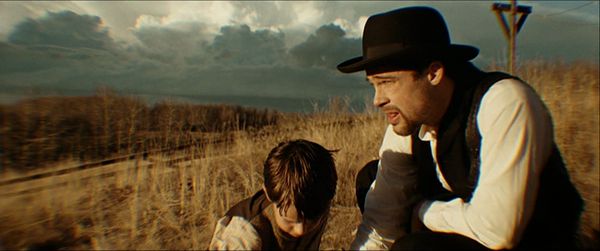Eye For Film >> Movies >> The Assassination Of Jesse James By The Coward Robert Ford (2007) Film Review
The Assassination Of Jesse James By The Coward Robert Ford
Reviewed by: Nick Da Costa

Assassination is no mere killing. It takes such tawdry events and elevates them to something with real significance, be it ideological or political. Andrew Dominik’s melancholic epic takes this a stage further, playing with our understanding of its unwieldy title over some two hours plus of slow-moving, yet transfixing filmmaking.
At the centre of this is the strange relationship between Jesse James (Brad Pitt) and the much younger, Robert Ford (Casey Affleck), who has become entranced by the mythology built up around this man by the dimestore novels and newspaper articles of the time. There is an immediate sense of unease as Ford seeks him out, wheedling his way into the celebrated outlaw’s gang, against the wishes of the more perceptive, elder James brother, Frank (Sam Shepard).

And yet Dominik concentrates on this attraction between these two men, sidelining those closest to him. Jesse's wife Zee (Mary-Louise Parker) is almost invisible while Frank disappears soon after the train robbery, a shared look between the brothers telling all a perceptive audience needs to know. Times have changed for Jesse. The ties are cut with the better days of his past in Frank, and the potential of a better future in Zee. Jesse's gang, a once proud, and loyal group of ex-guerrilla fighters are gone, replaced by the whoring, the dull-witted and the conspiratorial.
There’s a sense that this is really Ford's fantasy. The early train robbery, seemingly a construct of a potent imagination, transformed into an encounter between black knight and dragon. Beginning as a slow, low throb, growing into a howling ember-spitting monster that cuts the night in two. It’s a riveting scene, even more so for what follows. For just as we are initially taken by the charisma of Jesse, his foul, unnecessarily violent treatment of the bank guard knocks us back a step. In fact, Jesse seems almost addicted to his felonies, rejuvenated by the excitement and violence, and deathly bored by the periods of fallow.
Instead of this being a simple tale of early media obsession in Western form, the film posits Ford and Jesse as mythologically entwined, almost biblically. Affleck, startling, as this sickly angelic bundle of dichotomies - bold, yet timid, enfeebled yet strong. Pitt's Jesse is distanced as the figure of worship, shot through antiquated lenses as a foggy figure in history, almost a God, and a primal one at that, draped in furs and prone to explosive anger. It's a commanding performance, and though charismatic like most leads, he is also able to articulate the mystic in Jesse, seemingly existing outside this reality, playing with the wonderful language of the script, his eyes fixed on the endless stars or the spaces beyond the ice on a frozen lake.
Certainly charges of artistic extravagance could be made against Dominik, with the supreme talents of cinematographer Roger Deakins articulated in the grey and sepia of the landscape and the seemingly countless shots of lonely rocking chairs and whispering corn during the film's languid second act. But it is the same shorthand used by such luminaries as Malick and it serves to capture the elusiveness of Jesse, as if he were more spirit than substance; flitting from place to place, forever escaping incarceration lest it be one of his own making.
Dominik intoxicates us during this lulling, yet captivating middle section. Switching between the artistic naturalism of Malick and third-person docu-narration that give an authenticity as well as a new strangeness to events. The mood he creates hearkens back to the filmmaking of the Seventies; melancholic, yearning, always distancing us from fascinating characters and yet captivating because of it.
It is testimony to the power of this mood that when it changes, it catches us quite by surprise. Jesse’s paranoia grows at an almost animalistic rate until the Ford Brothers find themselves penned in with this slowly dying, psychotic presence. While Ford changes with him, steeling himself for what has to come, it is in these moments before his death that we see the real reasons for Jesse's relationship with Ford and the sting in this film's title.
Rather than fearing his death, he embraces it, playing with the affections of Ford, much like a lover, mocking him, taunting him, but always bringing him closer. In response to envy he placates and gifts him a gun, and thus creates his own killer. In that house, with its whitewashed purity and the sparse piano from Ellis and Cave's elegiac soundtrack, Ford pulls the trigger on an epochal moment, destroying his own life, and transforming Jesse's. It's terrifically resonant, turning the all too short final coda into something of a Greek tragedy, as Ford finds his own infamy too much to bear, his own end coming as a dull, blunt punctuation before darkness.
Reviewed on: 29 May 2010




















